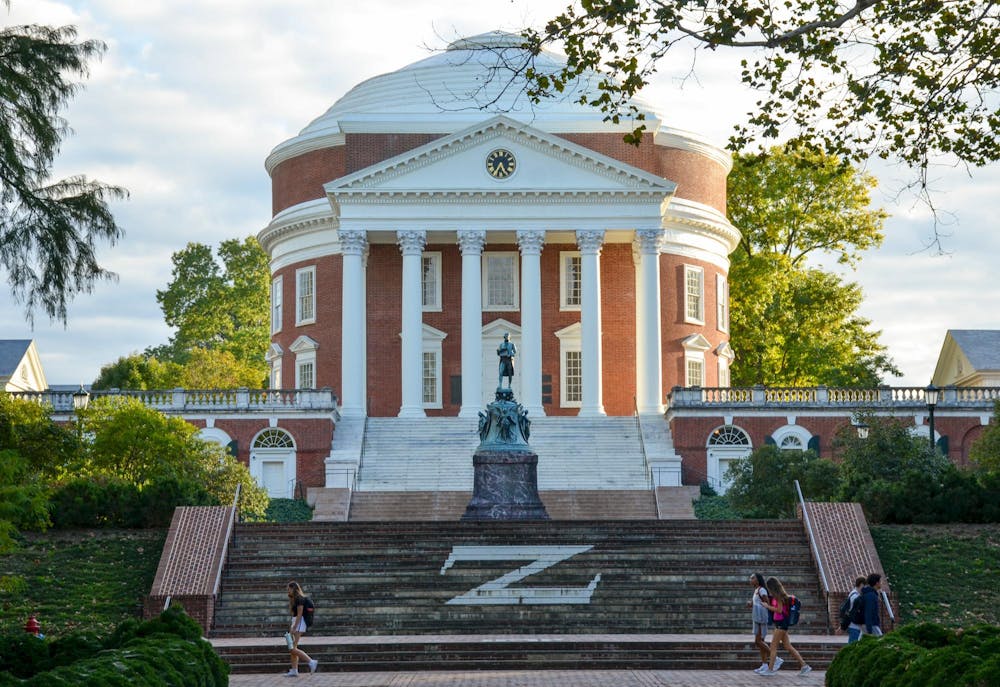Interim University President Paul Mahoney rejected the White House’s “Compact for Academic Excellence in Higher Education” Friday evening, following concerns from within and outside of the University community about federal interference. Opponents of the Compact cited potential violations of free speech, among other issues— the Foundation for Individual Rights and Expression voiced concern that the Compact could threaten First Amendment rights in a public statement Oct. 2, and the American Civil Liberties Union of Virginia followed suit in a statement released Wednesday.
The Compact promised preferential access to federal funding if the University adhered to principles such as freezing tuition, maintaining institutional neutrality, restricting race-based admissions and screening international applicants for support of “American and Western values.” Mahoney received the offer Oct. 1 with a deadline of Oct. 20 to submit feedback to the Trump Administration.
Within the Compact, a section on creating a “marketplace of ideas” would require that no political ideology “dominate” and ask that signatories create policies protecting academic freedom while simultaneously recognizing that “academic freedom is not absolute” in cases of discrimination or harassment. The Compact would also require a policy of institutional neutrality for all employees, meaning that faculty and staff may not comment on political events as representatives of the University.
Prior to Mahoney’s rejection Friday, Tyler Coward, lead counsel of Government Affairs at FIRE and attorney, noted his specific concern with some language of the Compact. He said the Compact appeared to grant the Justice Department sole authority as to whether a university was acting in accordance with the Compact guidelines and said these conditions raised concerns.
“Adherence to this agreement shall be subject to review by the Department of Justice,” the Compact stated. “Universities found to have willfully or negligently violated this agreement shall lose access to the benefits of this agreement for a period of no less than 1 year.”
Coward explained that there are First Amendment concerns under an agreement like the Compact if the Justice Department is calling for the University to avoid exercising free speech rights in order to gain access to government benefits.
FIRE released a general statement regarding the Compact Oct. 2, in which the organization said the Compact raised “red flags.” The statement said that the Compact’s request to ban all staff engaging in political speech is unconstitutional, as faculty — specifically of public universities — have the right to speak about politics in their classroom.
“A government that can reward colleges and universities for speech it favors today can punish them for speech it dislikes tomorrow,” the FIRE statement said. “That’s not reform. That’s government-funded orthodoxy.”
The Compact specifically said that University employees will avoid speaking to political events in their capacity as representatives of the University, unless these events directly impact the University.
“This requires policies that all university employees, in their capacity as university representatives, will abstain from actions or speech relating to societal and political events except in cases in which external events have a direct impact upon the university,” the Compact stated.
Coward seconded the words of the FIRE statement and pointed out two specific provisions of the Compact he said he found concerning. The first was the provision that called for institutions to be a “marketplace of ideas.”
“Signatories commit themselves to revising governance structures as necessary to
create such an environment, including but not limited to transforming or abolishing institutional units that purposely punish, belittle, or even spark violence against conservative ideas,” the Compact stated.
Coward said the conflation of speech and violence was worrying and is something FIRE has been critical of in the past.
“We’ve seen the trends across the country where people think that words are violence … then they use that to justify actual violence to shut down speech they dislike,” Coward said. “That is antithetical to living in a free society where people are free to discuss and debate ideas.”
Coward also said the fourth provision was striking in the Compact.
“Signatories shall maintain institutional neutrality at all levels of their administration,” the Compact stated.
Coward emphasized that FIRE believes institutional neutrality is a good thing, in the sense that universities should not take a position on current political battles. However, in an email to The Cavalier Daily, he wrote that the Compact would force institutions to turn over their First Amendment rights to get to that neutrality by having employees remain silent on all political and social issues.
“Under the First Amendment, the government can’t make [employee and institutional] silence the condition for funding,” Coward wrote.
Coward also said that the Compact would give the Justice Department final say as to whether a university was compliant, which could lead to an abuse of power from the Justice Department and increasingly tighter restrictions.
“If the Department of Justice starts saying, ‘Hey, we think that you might be violating this compact … aren't you going to do something about it?’ Institutions are going to choose … receiving access to federal benefits rather than standing up for the rights of their students and faculty,” Coward said.
The Justice Department has already questioned University policies this year, through seven letters sent to the University between April and June looking to affirm that Diversity, Equity and Inclusion initiatives had been dissolved. Some letters also claimed the University had not protected students from antisemitism. All seven letters were prior to former University President Jim Ryan’s resignation June 27, and two of the seven investigations have been resolved since then.
Coward additionally wrote in the email that “universities should not sign any agreements that threaten student or faculty free speech or academic freedom rights,” and Coward left final remarks to students and faculty if they feel as though their First Amendment rights have been violated.
“If your institution signs [the] compact and you face pressure from the university … or punishment for speech that's protected by the First Amendment, make sure to reach out to FIRE,” Coward said.
FIRE has a stated mission to defend the right to free speech and thought for all Americans and according to Coward, they do so by providing free legal and advocacy support to students and faculty who feel their rights have been violated. For the past six years, the organization has ranked approximately 270 American universities in regard to their state of free speech on campus. In 2025, the University was ranked first for free speech on college campuses in America, and in 2026, the University dropped to spot 21.
“We’ve defended people from across the political spectrum — our only test is whether their expressive rights are protected under the First Amendment or institutional promises of free expression,” Coward wrote. “The goal is to make sure that everyone on campus can speak, learn and debate freely.”
The ACLU-Va. — with a stated mission to protect civil rights for all Virginians — followed suit to FIRE, and ACLU-Va. Executive Director Mary Bauer released a statement Wednesday calling for the University to avoid signing the Compact.
“We urge the U.Va. Board of Visitors, Interim President, and working group to reject the anti-civil rights agenda the Trump administration is trying to force upon its faculty and students — one in which transgender students do not exist, foreign students are not welcome, and no member of the University of Virginia may do the critical academic work of fostering learning or exchanging ideas,” Bauer wrote.
Mahoney rejected the Compact Friday, emphasizing the University’s commitment to merit while also noting that he looked forward to any future collaboration with the federal government.
“We believe that the best path toward real and durable progress lies in an open and collaborative conversation,” Mahoney wrote in his letter to the federal government. “We look forward to working together to develop alternative, lasting approaches to improving higher education.”
The Trump administration originally hoped to receive a signed agreement from all nine universities offered the Compact by Nov. 21. However, Friday’s rejection by Mahoney made the University the fifth institution to reject the offer, following the Massachusetts Institute of Technology, the University of Pennsylvania, Brown University and the University of Southern California. Dartmouth College announced its decision to reject the offer Saturday morning, following the University’s decision.







